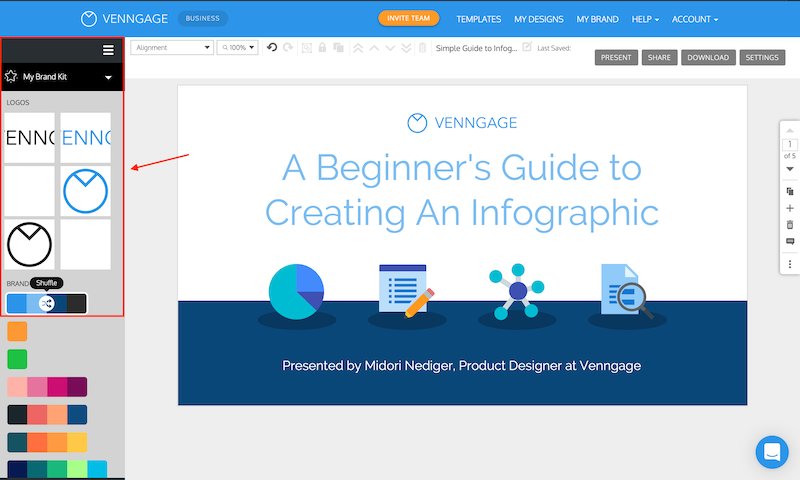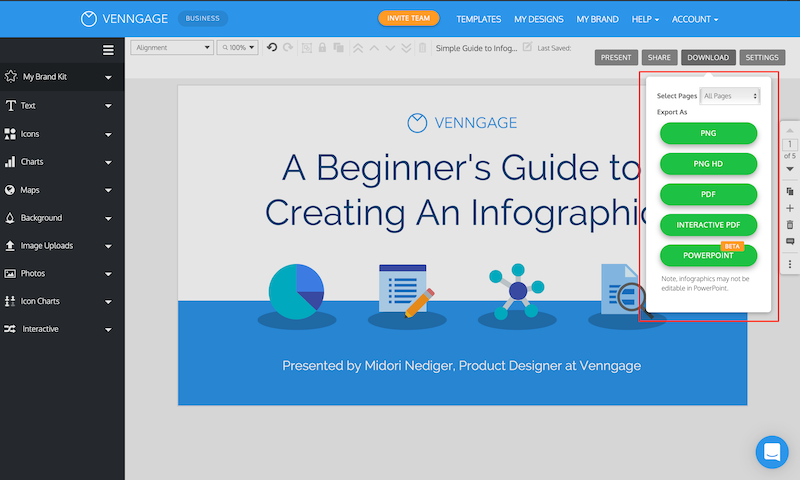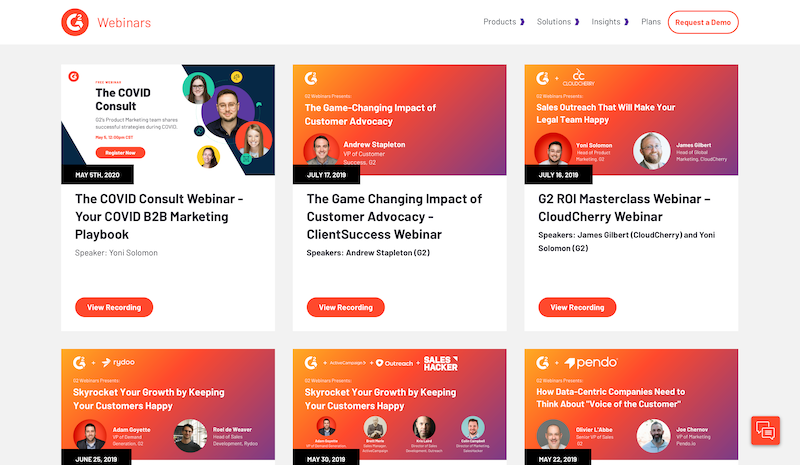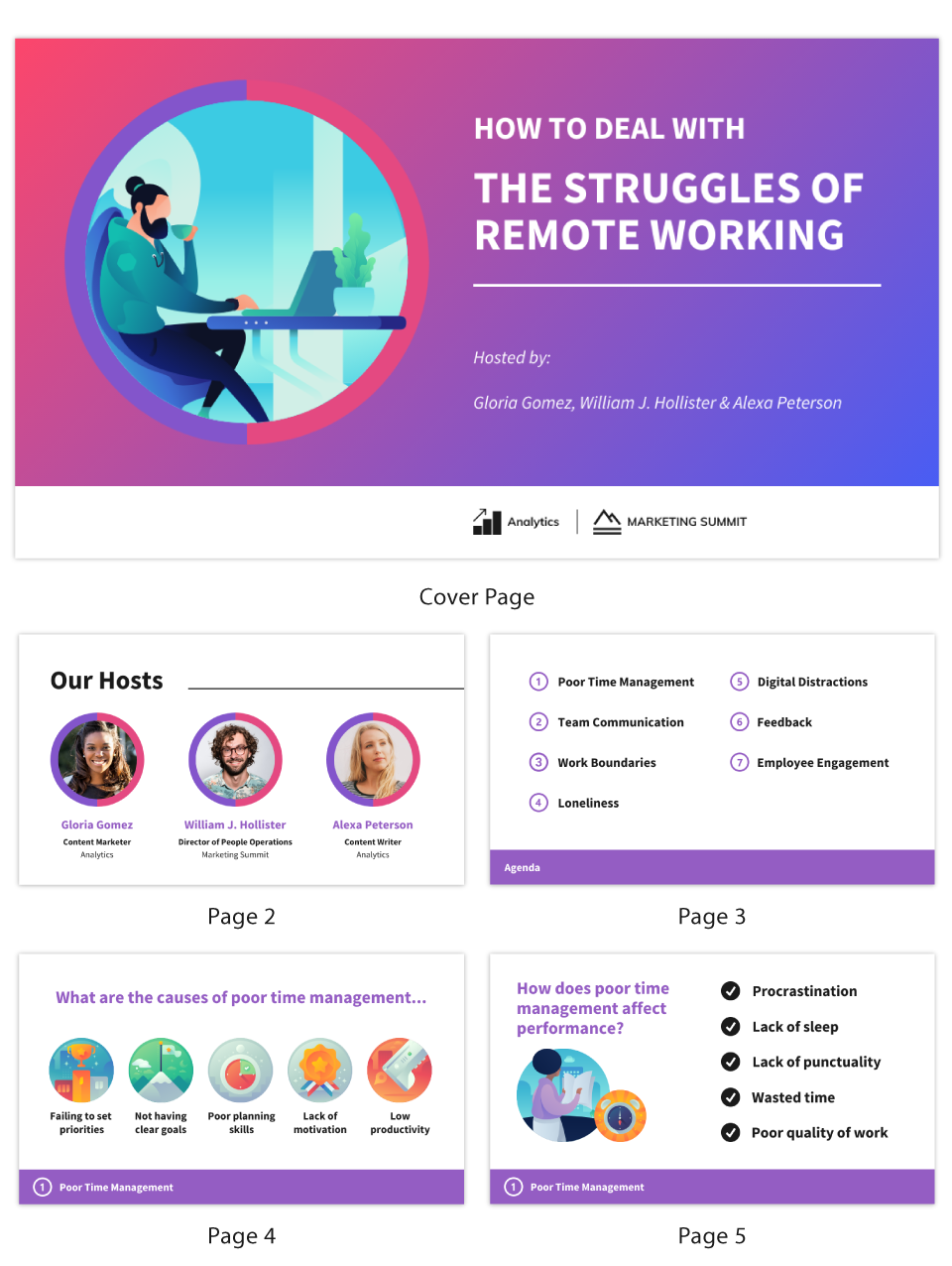
Webinar: What It Is, How It Works & How to Create One
[ad_1]
With a global pandemic taking the world by storm and forcing people to work from home, webinars have seen a resurgence in popularity and usage across the globe.
In the last decade (especially in the last few months) webinars have become a staple for educating students and potential customers, lead generation for your business, and captivating large online audiences.
If you’re new to webinars, you’re probably asking yourself…
In this guide, I’ll give you a crash course on what is a webinar, how you can create a webinar and showcase plenty of examples to answer all your webinar-related questions!
Let’s dive right in.
What is a webinar? Webinar definition:
According to Merriam-Webster, a webinar (or web seminar) is “a live online educational presentation during which participating viewers can submit questions and comments.”
You might be wondering, “well, what is a seminar?” Seminar definition: “a meeting for giving and discussing information.”
Webinars are events, video presentations, workshops, seminars, training sessions, or classroom lectures hosted and delivered online using webinar software.
What makes webinars effective is that they’re a two-way form of communication where the attendees and presenters give, receive and share information with each other, in real time.
Webinar vs. Webcast
A webinar is not a webcast. Webcasts are pre-recorded sessions that broadcast online (on TV or YouTube). Webinars are live sessions allowing real-time interactivity between the presenter and attendees.
For example, our growth by content live webinar teaches business owners how to use content marketing to drive business growth without a massive budget:
If you’re new to webinars, a great way to familiarize yourself is to attend other webinars (like the one above) and take notes.
Hosting webinars has plenty of uses and benefits, but before we dive into creating a webinar it’s important to understand how and why webinars work in the first place.
How does a webinar work?
Webinars allow presenters to share documents of all kinds including but not limited to voice notes, videos, presentations and other documents, etc with their attendees.
Webinars have plenty of uses (often business-related) but the most important and biggest use for webinars is to educate and engage an audience).
Your audience could be anyone from new or existing customers, industry peers or even the students in your classroom.
This means webinars are useful in any industry where communicating with your audience is a key factor in your personal or professional success.
Webinars can also help you with all of the following:
- Educate your audience about your business.
- Build authority in your industry or niche.
- Demonstrate your product to customers.
- Onboard new customers to your product.
- Training both new and existing employees.
- Generating leads for your business.
In the marketing world, the main use for webinars is lead generation.
For example, our “Infographic Design 101” webinar is aimed at helping our current customers visualize their ideas and attracting potential customers to sign up for Venngage:

This was a live webinar the first time but now lives as a pre-recorded webinar that generates new leads for us on a daily basis.
If you’re new to webinars or want to learn how to visualize your ideas, I highly recommend checking out this webinar.
Another way marketers use online webinars is to build authority, credibility and thought leadership in their industry.
Drift’s approach to thought-leadership webinars is a prime example:
Drift leverages webinars for multiple purposes ranging from educating new and current customers, establishing thought leadership, and collaborating with other SaaS companies.
This helps Drift position themselves as a subject matter expert in the SaaS industry.
Another example is R&D tax credit software Boast.AI.
Boast.AI produces two webinars per week in their community, branded Traction, bringing founders and leaders from some of the fastest-growing companies to share actionable, tactical advice on business growth.
If you’re creating a marketing plan and your goal is consistently generating high-quality leads for your business, webinars should be a crucial piece of your strategy.
Webinars are also used extensively in eLearning. As an educator, your ability to reach more students expands dramatically. Right from the comfort of your home.
Students don’t need to travel and with the current crisis that’s forced everyone to stay home, online webinars can be the most important learning tool in a teacher’s arsenal.
Here’s an example of how HBR approaches educational webinars:
After reading this guide in its entirety, you’ll have a better understanding of how to replicate their approach to webinars for your own institution or classroom.
Why are webinars effective?
What makes webinars effective (compared to physical events or workshops) is that with webinars, you don’t need to rent out a physical location or deal with complex logistics that arise from hosting in-person events.
In fact, in 2020, the number of organizations planning a virtual event has doubled.
With a plethora of webinar pros (vs physical events), rich-feature sets, support for multiple content types, the possibilities are essentially endless.
Advantages of webinars
Since webinars are online events, they’re convenient for both presenter and attendee as you can host and attend webinars right from the comfort of your office (or home.)
Whether it’s presenting to a small group or a group of 100+ attendees, webinars work in both these scenarios.
Webinars can be pre-recorded and played at any time for participants. This makes them easier to set up, repurpose, and budget-friendly compared to in-person events.
Offline events have their own merits, but with live webinars you don’t need to spend time agonizing over venue rentals, food, beverages or making sure your presentation equipment works.
People have used webinars creatively for education, marketing, sales, branding, human resources, user onboarding, etc. So when it comes to what you can do with webinars: the sky’s the limit.
A lot of webinar tools come with interactive whiteboards, surveys and polls, live-chat features which make them far more personalized, engaging and interactive for your audience.
These are just some of the reasons why webinars have been exploding in popularity in recent times.
Webinar formats
Webinars come with tons of customizable features as well as support various content formats such as:
- Live video: the most common type of webinar. Live webinars tend to garner the most engagement.
- Pre-recorded: most webinars are live, but you can always record a live webinar and future participants can register for them as they please. Most Ideal for evergreen topics.
- Text: Most webinars tools come equipped with text chat features. Ask and answer your audiences’ questions, in real time.
- Whiteboard: used to draw out and explain important concepts.
- Surveys and polls: want to keep your audience engaged? Use surveys and polls to get attendees to answer questions and organize it all in one place.
But the most common way to conduct webinars is by creating and presenting a slide deck presentation.
Here’s an example of a webinar presentation you can edit and customize right now:
Once you learn how to make a great webinar presentation, you can always kick things up a notch by experimenting with different webinar tools as well as whiteboards, polls, surveys, etc.
What are the different types of webinars?
Venngage has a fair amount of experience when it comes to participating and hosting webinars for marketing, lead generation, and joint collaborations.
But that’s not their only use. Here are just some ways you can harness the power of webinars:
Webinars for marketing, lead generation and partnerships
When it comes to lead generation, there’s a lot you can do:
- Creating in-depth industry white papers,
- Publishing case studies to promote your product, and
- Designing ebooks and offering them up as lead magnets.
But, the greatest bang for your marketing buck can come from hosting webinars due to the high-quality leads they help generate.
Companies like Drift, ConvertKit, G2, etc have successfully leveraged webinars to scale their lead generation and in turn, increase revenue. If webinars worked for them, they can work for you too.
For example, G2 hosts webinars regularly with the goal of generating leads for their software:
G2 covers a wide variety of topics in their webinars. Not only that, joint webinars are the perfect way to team up with other companies and subject matter experts in your industry.
Conducting joint webinars allows you to:
- Partnering with other companies gives you access to their audience. They could even be potential customers who would otherwise be oblivious about you.
- Collaborating with other companies adds credibility and authority to your content establishing you as a thought leader in your industry.
At Venngage, we use webinars to educate our audience and lead generation becomes a natural by-product of this goal:
With this webinar our goal was simple: helping businesses navigate the pandemic by outlining how they can grow using content marketing (like we have).
With physical event cancellations and the world being forced to work from home, companies are slowly transitioning from hosting physical events to events hosted virtually (with webinars).
For example, Wishpond opted for a virtual event to make it easier for participants and attendees to partake (even from home):
Pro Tip: If you provide massive value to your audience in your webinars, chances are you won’t even need to promote your product. Help your audience with their struggles, and they’ll not only become a customer but also a raving fan.
Webinars for education
Webinars have exploded in popularity in the last few years as a powerful learning tool, not only for marketers but also for schools and universities.
For educators, webinars are the best way to reach and engage students. No classroom required. For students, they get to learn from the comfort of their own homes.
Due to the pandemic, colleges and universities have transitioned to distanced learning. So webinars as a learning tool have surged in popularity.
My alma mater, Seneca uses educational webinars for all occasions—from educating potential students to onboarding new students and also hosting virtual open houses:
If you’re a college or university trying to onboard incoming students for the new semester, webinars are an absolute no-brainer. Here’s an onboarding webinar template you can use:
If you’re a professor looking to experiment with webinars as a learning device, you can use this webinar presentation template for your next online class:
Pro Tip: Want to make your webinar even more engaging? Invite external educators and subject matter experts to collaborate with you on your next webinar.
Webinars for product demos
Companies have started adopting webinars for product demos to strategically sell their products and build a deeper relationship with prospective customers.
But when is the ideal time to start using webinars for product demos? The answer: Now!
Today’s buyers are digitally savvy and comparing competing products to make the best buying decision. Sending over a business proposal and hoping for the best isn’t going to cut it anymore.
A product demo webinar is an opportunity for you to showcase real case studies of your current customers, how they’ve used your product successfully, and how your prospect can achieve the same results.
OroCommerce, the B2B eCommerce platform does a great job with product demo webinars. Every time they release a major product update they hold product demos going over the benefits of every new feature.
When presenting a live webinar that targets your audience’s pain points, strategically tie in your product into your presentation and how it helps your attendees solve their burning problems.
Here’s an example of a product demo webinar presentation you can use to demo your products or services:
Pro Tip: Product demo webinars also helps you gather critical customer feedback. If you’re a startup, start conducting regular webinars to gather crucial feedback to make your product better.
Webinars for employee training
Webinar tools can double as meeting software and training tools for training both new and existing employees.
This is especially useful if you’re communicating with a remote team. Or even a team that’s too big to sit in one room together.
You can start by including webinars in your onboarding materials or conduct a webinar-esque orientation where you outline your company’s expectations, vision, mission and address questions your new hires might have.
They can also be used to showcase your company’s culture and how it will matter to your new recruits.
Related: How to Create a Successful Employee Training and Development Program
Webinars are the perfect tool for educating your employees on niche but important topics like productivity, workplace diversity, safety, employee engagement, etc.
Want your next company-wide webinar to cover the topic of workplace accessibility? Here’s a presentation you can use for your next webinar:
Webinars for user onboarding and retention
If you’re a Software as a Service (SaaS) company like us, you know how important customer onboarding and retention is for the bottom line of your business.
You may already have onboarding flows in your product, but it’s never a bad idea to explain to your new customers how your product works by inviting them to a user onboarding webinar.
With your user onboarding webinar, make sure you cover the most important aspects of your products, keep the learning curve as low as possible and invite users to ask questions while you’re presenting.
Saas company Drift takes the cake with their ingenious use of webinars (especially the third one) to onboard new customers:
Once you sign up for Drift, they send you an email with a webinar-style video tutorial on how to get started with Drift. Genius.
Pro Tip: It’s 5x more expensive to acquire new customers than to retain an existing one. Use tools like onboarding emails, push notifications, webinars, etc. to retain your new customers so they stick around, upgrade to your paid plans and spread the word about you.
How to create and host a successful webinar
There are plenty of free, paid as well as ad-supported webinar tools available in the market. And most of these webinar hosting tools come with similar features.
Picking a webinar tool that’s right for you comes down to your business goals, budget as well as what you value in a webinar tool.
Here are some webinar tools to help you get started:
- Zoom (freemium): The most well-known online meeting tool also doubles as a webinar tool. Starts with a free plan and offers paid business plans with robust features.
- WebinarJam (paid): Starts at 499$/year and includes features such as live chat and automated recordings.
- WebinarNinja (paid): Starts at 39$/month for upto 100 attendees. It also comes with a free 14-day trial so you can take them for a test drive.
- ON24 (free trial): Comes with powerful attendee, reporting and marketing features. Integrates with plenty of other tools, but every integration is priced.
- Zoho Meetings (paid): Starts at 15$ for 25 attendees. You can also host up to 250 attendees for just 63$/month.
Want to dig deeper? Our friends at G2 have reviewed every popular webinar tool to help you make the right buying decision for your specific needs.
Create your own webinar in five steps:
Once you’ve spent the time on picking the right webinar hosting tool, now onto better things: creating your first webinar!
Creating your first webinar can be overwhelming but I’ll outline the exact steps you need to follow to make your first webinar a roaring success. Here they are:
1. Identifying the goal of your webinar
Webinars have many uses and by extension, webinars also help you accomplish different goals.
Start by asking yourself, “What’s my goal with this webinar?” Is it:
- Generating more leads for your sales team?
- Educating your students studying from home?
- Selling an idea or concept to potential customers?
Once you’ve identified the goal of your webinar, think about what your key performance indicators (KPIs) will be to determine the success of your webinar.
After determining your goals and KPIs, make sure everything you do: creating your webinar content, promoting it, etc ties back to this goal.
If the goal of your webinar is to teach potential clients motivation 101, your best bet would be a purely educational and non-salesy presentation:
Pro Tip: Above all else, put your audience first. What are their pain points? What kind of content do they care about? If you tailor your webinar to your audience’s needs and pain points, success is imminent.
2. Attend other webinars
The best way to plan, create, and host a webinar successfully is to scope out the competition.
Look at your industry and start researching companies that are successfully using webinars to educate or sell to their audience.
What can you do differently or do better? Can you better interact with your audience? Can you ask better questions? Can you improve the content of your webinar?
Be curious and take notes whenever you can.
Once you attend a few webinars, you’ll have a general understanding of which webinars are hits and which are misses. All that’s left is to emulate webinars that were a roaring success.
To start, check out our webinar on driving business growth with the help of content marketing:
3. Plan and outline your content
In this step, you’ll start putting together your webinar outline and lay down the groundwork i,e. Invite your attendees, plan your event logistics, and decide on a webinar promotion strategy.
Creating an outline for your webinar content is easy if you already have a goal in mind.
For example, if the goal is to educate new users on how to create an infographic using Venngage, here’s what an outline might look like:
- Introduction
- What is an infographic?
- Use cases for an infographic
- How to make an infographic?
- How companies use infographics
A webinar outline can help you stay focused on the topics your audience cares about (based on research) and prevent you from getting side-tracked.
The best part? You will eventually end up with a webinar presentation like this:
Pro Tip: Like any presentation, you need to rehearse for your webinar. This is even more important if you’re presenting to a large crowd online many of which could be potential customers. First impressions are everything, as they say.
4. Design your webinar presentation slides
Once you’ve identified the contents of your webinar, time to start designing the actual webinar presentation!
To start off, hop onto Venngage and pick a presentation template you like. We’ve got 100s of templates for all occasions and types ranging from professional to quirky:
Starting from a blank presentation is hard. Trust me, I’ve tried.
So pick a presentation template you like, you can customize it to your heart’s content anyway.
Start playing around with the template, editing various elements like fonts, headers as well as the presentation layout.
If you’re on our business plan, you can use MyBrand Kit to automagically import your brand guidelines (logos, colors, and fonts) into your designs:

Need a helping hand? Bring on your team to edit your presentations and bring your webinar to life! Turn on real-time team collaboration (a business plan feature): 
Once you’ve put all the final touches, export or download your presentation:

The real kicker? Venngage’s presentation maker can export your presentation in a .pptx format for importing within Powerpoint. Pretty cool right?
If you’re a fan of keeping it simple, you can present your webinar from right within Venngage using our presenter view feature.
And that’s it — once you’ve made an engaging presentation, prepared your speaking notes, and tested your webinar you’re officially ready to present your webinar to a live audience!
Pro Tip: Don’t forget to collect feedback from your audience after the webinar! A tool like Paperform can help you survey attendees and improve your future webinars.
5. Marketing (or Promoting) your webinar
You’ve front-loaded the most important work: planning your webinar, setting up webinar tools, goal setting, competitor research, etc.
But unless you promote your virtual event, nobody will know how valuable it will be for them. So the final piece of the puzzle is webinar marketing.
Webinar marketing isn’t complicated, all you have to do is create event posters, social media visuals as well as event timelines informing attendees about the agenda of the event.
Here’s an example of a virtual event poster template you can edit (paid plan only) right now:
If you’re a business that engages in email marketing and has an existing email list, leverage it.
We promote all our webinars to our customers through our email newsletter and I recommend you do the same.
Here’s a webinar invitation newsletter template you can send out to your email list:
Promoting your webinars on different social media networks is the lowest hanging fruit you should go after.
Head over to our templates page and you’ll find a huge collection of eye-catching designs for every social network (all sized to the right dimensions).
Need to promote your next non-profit webinar on Instagram? But don’t want to use boring stock images? We’ve got you covered:
Creating, customizing, and sharing promo materials for your next webinar is easy and intuitive with Venngage.
With access to 1000+ professional templates, an ever-growing collection of icons and illustrations (all of which are free), features like Brand Kit and real-time team collaboration:
Looking for a one-stop shop to design event posters, banners, social media graphics, email newsletters, and much more? Sign up for Venngage today!
Conclusion
Now you know the basics of everything from what’s a webinar, how to make a webinar, and the webinar conferencing software you will need to host a webinar.
If you’re ready to start creating webinars that educate and captivate your audience regardless of industry or profession, make sure you keep the following webinar hosting best practices in mind:
- Pick the right webinar tool. This comes down to your budget, goals as well as features you want in your webinar hosting software.
- Identify your goal. What are you trying to achieve with your webinar? What content does your audience care about? What are their pain points? Clarity on your goals is crucial above anything else.
- Snoop on your competitors. How are your companies leveraging webinars? Take notes and think about what you can do differently or better with your webinars.
- Promote your webinar. You’ve worked days, weeks (or even months) to create an awesome webinar. Let the world know about it!
This article is also available in Portuguese: O que é um webinar e como ele funciona? [guia para iniciantes]
Did you enjoy this in-depth guide on webinars? What was your favorite tip? What are you struggling with? Drop them in the comments below, and let’s talk about it!
Check out some of our other popular design and how-to guides:
How to Make an Infographic in 5 Steps (Guide)
How to Write a Business Proposal [Examples & Templates]
[ad_2]
Source link





























![6 Steps to Create a Strategic HR Plan [With Templates] 6 Steps to Create a Strategic HR Plan [With Templates]](https://venngage-wordpress.s3.amazonaws.com/uploads/2022/08/3e611956-2d22-469e-bbea-a3d041d7d385-1-1-1.png)




